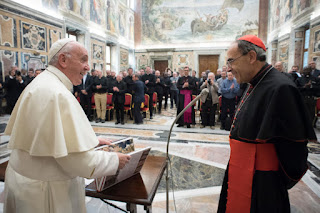Cardinal asks forgiveness for the way the Church has treated the divorced, separated and remarried
Cardinal Philippe Barbarin presented on Sunday, October 15 to a full cathedral the "paths of discernment" proposed by Pope Francis in Amoris Laetitia.
After Rouen and Le Havre, Lyon is the third diocese to organize such a meeting, to "concretely implement" the Apostolic Exhortation on the Family.
Catherine waits on the forecourt. A book under her arm, she watched Cardinal Philippe Barbarin. For an hour the Archbishop of Lyon lingered with those "people who had experienced a marital breakdown", whom he invited on Sunday evening 15 October, to exchange thoughts with him in the Cathedral of Saint John the Baptist. The night has fallen, Catherine can finally hand the work to him. A copy of The Joy of Love, the apostolic exhortation on the family that this childcare assistant asks the cardinal to dedicate. Before starting the conversation.
At her side, her new companion, Laurent. This maintenance technician had to "leave" his parish, at the same time that he separated from his wife. Like Élodie, "unmarried mother", who joined the exchange. "We had to be accepted elsewhere," she regrets. "We feel that the Church is no longer fixed on these issues," underlined Laurent, 52 years old. Catherine and I went to see the priest freshly arrived in our parish. He welcomed us. "
Ensure to "never use the language of the permitted and the forbidden"
Symbolically seated among the crowd at the beginning of the encounter, and then encountered in the shadow of a pillar, the cardinal applauded at the end of the six testimonies of "separated, divorced or divorced remarried Catholics ", delivered before a full cathedral. This, a year and a half after the publication of Amoris laetitia. And ten days after meeting Pope Francis, with 80 priests of the diocese. "When I asked the priests: What theme would you like him to talk to?", The answers were unanimous: "On Amoris laetitia chapter 8" to "accompany, discern and integrate fragility" ", says the cardinal.
For it is "a difficult road" opened by the Pope, commented the Archbishop of Lyon. Starting from the points on which Francis insisted on to the Lyon delegation. First of all, to consider "people first" and not marital situations. Next, make sure to "never use the language of the permitted and forbidden".
A "difficult road", therefore, that some priests of the diocese borrowed. Like Father Franck Gacogne, parish priest of Saint-Benoît, in Bron, standing beside Florence and Georges. It is they who speak, with a voice. Twelve years ago, they sought to "reconnect with the Church", especially during the baptism of their three children. But they had long received only "inadequate answers," they say modestly.
The cardinal wanted to "ask for forgiveness"
Other witnesses do not hide the sufferings. Some say they have found themselves found in a "club of outcasts". "Neither judged nor dismissed from the Christian life," another person confides nevertheless "to be confronted with contradictory, indifferent or embarrassed positions of certain pastors". And the cardinal insisted on "asking for forgiveness," before handing each of the witnesses a copy of the apostolic exhortation.
Finally, Florence and George were heard, in the person of the parish priest of Bron. "Are you at peace?" This was his first question, "reports the couple who are both divorced and now remarried, who then chose to get involved in the local community, by holding welcoming consultations. The beginning of a long journey. They were now going to Mass as a family. But they felt "lonely on their bench" at the time of communion. "The more we find our place, the less we feel we have the right to have it," they summarize.
Thanks to the paths opened by Amoris laetitia, the priest offered them a support, based on a course built by the Reliance Teams linked to the Teams of Our Lady. Then they prepared "a celebration with a blessing of our couple". At the next Sunday mass, they returned to the Eucharist. And they became even more involved in the parish, especially with other divorced-remarried couples, who were in turn engaged in a path of discernment. Before, "possibly", like them, an access to the sacraments.
Reception groups are still rare
This prudence is in line with that of Cardinal Barbarin, who developed the question at length, recalling that "access to communion has always been a delicate problem in the Church" for all Christians. As for the divorced-remarried, of course, he says, "when a person cannot bear not being able to communicate and finally decides, because of this internal hurt, not to come to Mass, it would be absurd and inhuman to continue to wield a banning sign in front of them. " "For some people, the Cardinal repeated several times, this path of faith will go through the fact of going communion, for others to participate in the mass without communion, like Charles Peguy. "
The important thing in the eyes of the Cardinal is above all to enable those "in a situation of rupture" to "find their place in the Church". And, from this point of view, there is still some way to go.
The Florence and Georges route is a rare example of support driven by a parish dynamic. "Some of my colleagues are aware of the issue, but perhaps they prefer personal support," says Father Franck Gacogne, “While the ecclesial dimension seems important to me”. In fact, few parishes in the diocese of Lyon have for the time being set up a reception group for people whose marriage has broken down.
The latter are currently invited by Bénédicte and Édouard Michoud, episcopal delegates for the pastoral care of families, to "continue with their local community, their parish". Without a "single path", they insist, the important thing being "to overcome possible fears". On the part of the people whose marriage has broken down, as on the part of the local communities.










.jpeg)

Comments